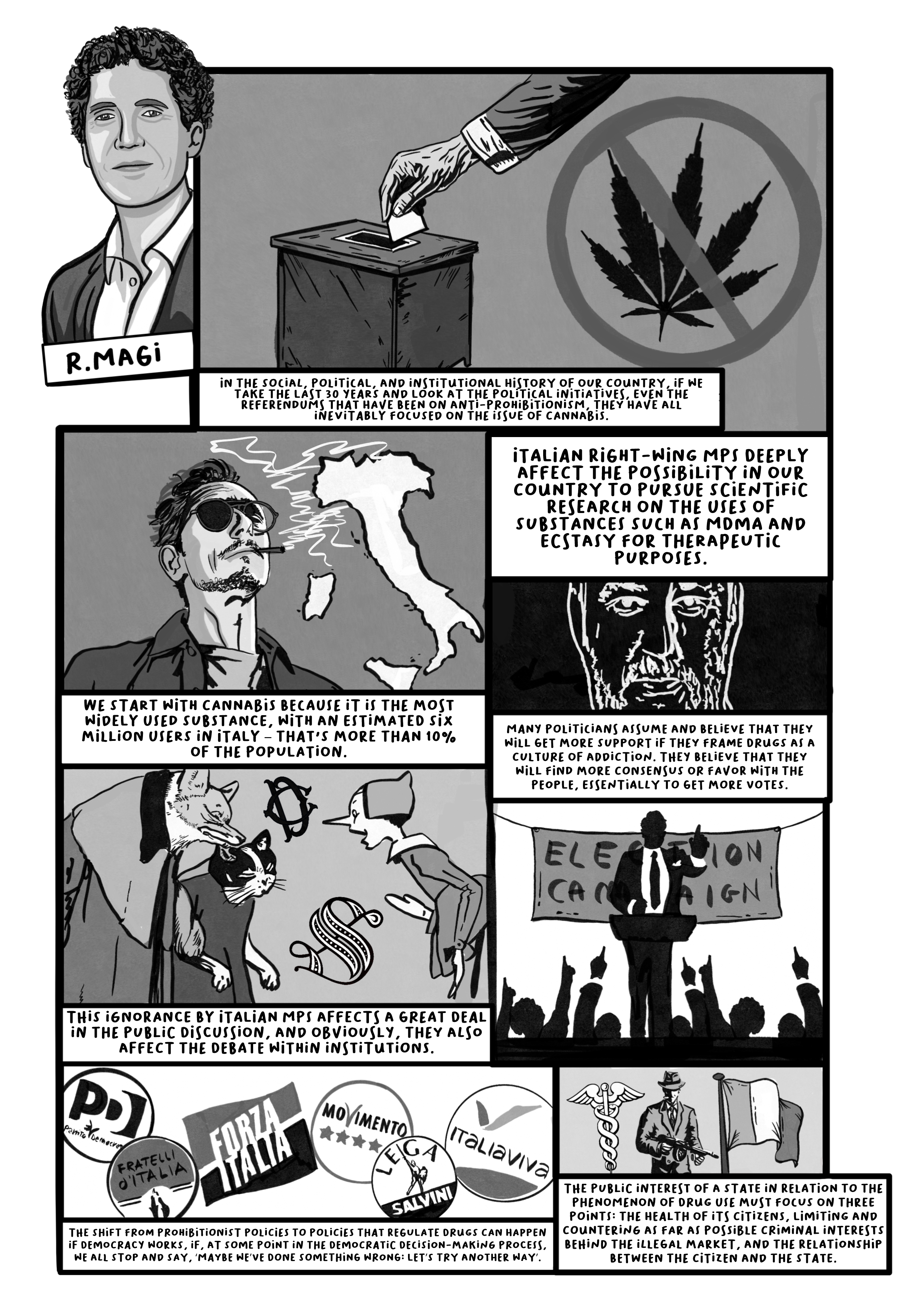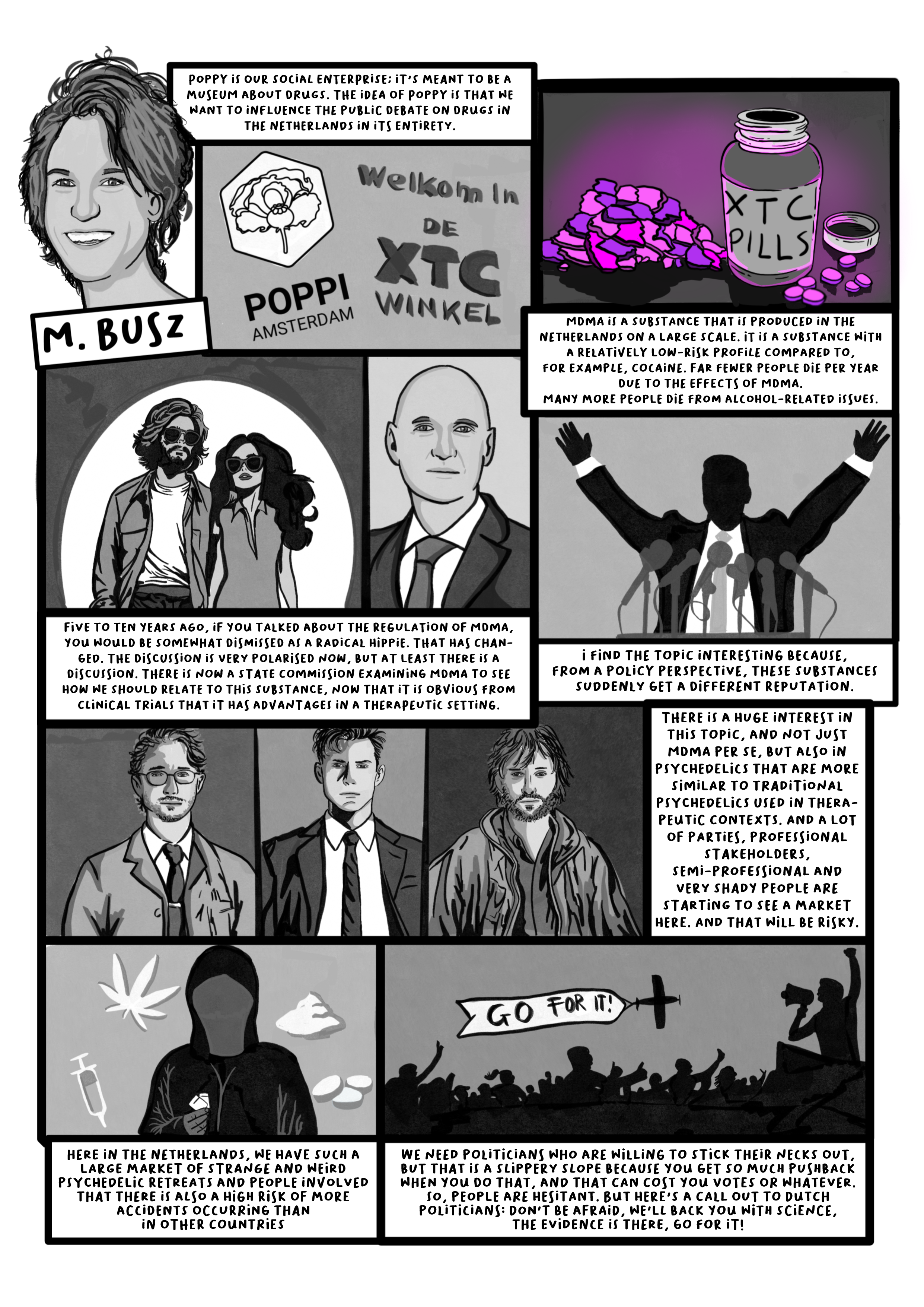The ecstasy of therapy
The Ecstasy of Therapy is the first-ever European audio-cartoon investigation that presents a scientific report on the potential of drugs to treat mental illnesses – in our case, MDMA/Ecstasy to heal PTSD, comparing the cross-border conservative and progressive political perspectives in Italy and the Netherlands. The final objective? To open a debate about the distorted narrative around the matter and shape a more aware public opinion about heavy drugs and the therapeutic value they can have for society.
Illustrations by Riccardo Seghizzi. Podcasts by Angelos Apallas and Francesco Guidotti. Audio dubbing by Amedeo Gasparini and Micky Wouter. Story production by Michele Calamaio and Nathan Domon. Executive production by Julius E. O. Fintelmann. Publication on 23 December 2023.
Federico Menapace: The USA is one step ahead of the EU: Menapace and MAPS
The Multidisciplinary Association for Psychedelic Studies (MAPS) is a nonprofit that started about 37 years ago with the mission of creating a legal and cultural context for people to benefit from the use of psychedelics and marijuana. Federico Menapace, Deputy Director, gives us an overview of what is happening in the USA and how their achievements create a bridge with the EU.
Tijmen Bostoen: One year of therapy in a day: MDMA trial in the Netherlands
Tijmen Bostoen is a Dutch psychiatrist specialising in PTSD treatment who MAPS has trained to participate in a clinical trial of MDMA-assisted psychotherapy in the Netherlands. Bostoen guides us through a typical session, detailing the preparation, the process, and its role in assisting patients in confronting their trauma. “If it goes well, they told me it’s like a year of therapy in a day.”
Agne Henrik: A journey from PTSD to healing with MDMA therapy
Agne Henrik is among the few patients who participated in the MDMA trial in the Netherlands. He developed PTSD after serving in Bosnia in 1995 as part of the UN peacekeeping mission. Henrik has chosen to share his story to illustrate how the treatment helped him overcome his trauma. However, he warns: “It’s not a magic bullet. It shows you the way, but you still have to do it yourself.”
You can also learn more about his story on his personal blog.
Annalisa Valeri: Psychotherapy and MDMA: The Italian perspective
Annalisa Valeri is a psychologist and psychotherapist who has been studying the use of drugs for therapeutic purposes for several years and is part of a research group on non-ordinary states of consciousness at a study centre in Italy. Her expertise? The healing value of Ayahuasca. She has helped her first patient, Sara (fictional name), treat herself with MDMA, gaining some powerful insights despite the illegality of such actions in Italy.
Sara: From hell to heaven: MDMA can be a breakthrough
Sara (fictional name) is one of the two main characters of this investigation: Annalisa Valeri’s patient, she decided to share her journey with MDMA and psychotherapy. In Italy, however, treating a mental condition with heavy drugs is still illegal. How did she manage to turn this around? “I tried it alone," she says, but she wishes in the future the government would allow legit support from a psychotherapist.
Riccardo Magi: “We need to fight Italian prohibitionism.” MP Riccardo Magi’s docet
Riccardo Magi is a 47-year-old Italian politician and MP, secretary of the small center-left pro-market party +Europa (More Europe). Together with former MP Caterina Licatini (5 Stars Movement), he proposed the Magi-Licatini bill on cannabis decriminalization for chronic diseases, the only concrete effort of Italian politics in placing additional economic resources aimed at assisting disabled people who use palliative ecstasy. Since then, however, nothing has changed.
Joost Sneller: Breaking barriers: the politics of psychedelics in the Netherlands
Joost Sneller is probably the most vocal Dutch politician on psychedelics in the Netherlands. In this episode, this Member of the Dutch Parliament discusses his mission to break the taboo on psychedelics, the challenges in differentiating clinical from recreational use, and the nation's pioneering role in this field at the international level.
Machteld Busz: Beyond the high: MDMA's hype in the Netherlands
Machteld Busz is a Dutch activist whose goal is to stimulate the debate on drugs with her organisation, Poppi Drugs Museum. She discusses the evolving social and cultural landscape of MDMA in the Netherlands, delving into the changes in perception, the growing expectation, as well as the underground practices, highlighting the nation's complex relationship with psychedelics, both in therapy and recreational use. “Let's not go too fast,” she warns.
Marco Perduca: Legislation for therapeutic drugs is made by parliament, not activist associations
Marco Perduca is a member of the Luca Coscioni association and coordinator of the anti-prohibitionism campaign. During his period as MP in the Italian Chamber of Deputies, he presented a popular initiative bill for the legalization of cannabis. Despite his biggest efforts in pushing for legislation on therapeutic drugs for medical treatments, Italy hasn’t stepped up, taking into consideration the “religious problem” too, a “real obstacle to narcotics.”
Agnese Codignola: What’s the future of Italian scientific communication? Knowledge
Agnese Codignola is an Italian scientific journalist who wrote about therapeutic drugs for mental illness treatment and published a book called “LSD, Inside the Psychedelic Renaissance" in 2018. The book talks about how this heavy drug has revolutionised the world of medicine but has encountered much resistance in the field. Why? According to her, “Italy is a deeply ignorant and ideological country.”
Berrie van der Molen: Media and MDMA: How to talk about drugs?
Berrie van der Molen is a Dutch media researcher. He shares insights from his study on ecstasy's discursive formation in Dutch media from 1985 to 2006, exploring the evolution of its public image from a cultural phenomenon to a hard drug, and discusses current debates and framing in the media on its therapeutic potential. “We need to let go of the stigma.”
This publication was produced with the financial support of the European Union. Views and opinions expressed are however those of the author(s) only and do not necessarily reflect those of the European Union or the European Education and Culture Executive Agency (EACEA). Neither the European Union nor the granting authority can be held responsible for them.












